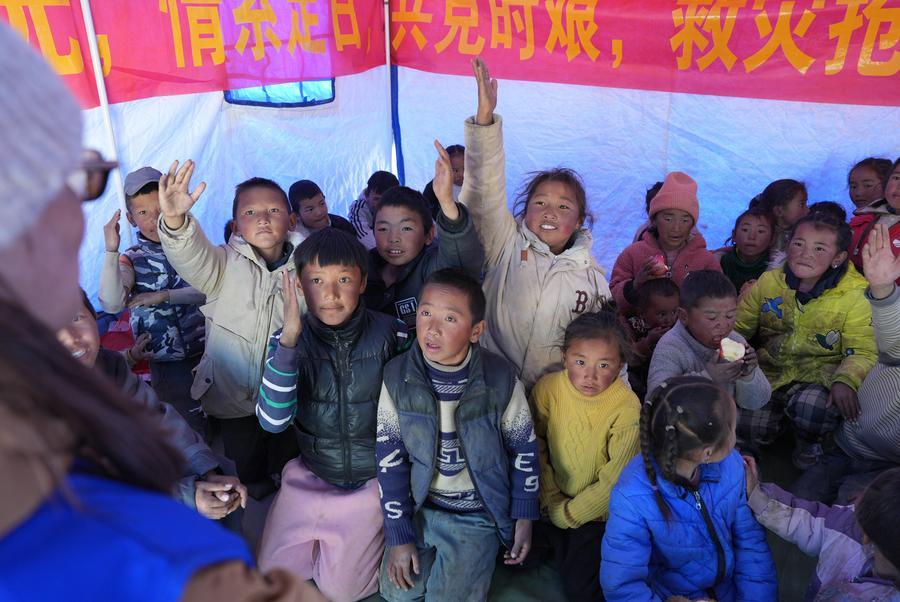Restoring smiles, rebuilding hope in helping children after Xizang quake

Children raise hands to answer questions during a psychology class given by a social work service center at a relocation site of quake-affected residents in a village in Dingri County in Xigaze, southwest China's Xizang Autonomous Region, Jan. 8, 2025. (Xinhua/Jigme Dorje)
LHASA, Jan. 11 (Xinhua) -- Cedain Lhamo, a trauma counselor at a relocation site in Dingri County, grew concerned when she saw a young girl covering her ears and fleeing in distress during an aftershock, even though the girl was outdoors and in the open.
On Tuesday morning, a strong 6.8-magnitude earthquake struck the county in southwest China's Xizang Autonomous Region, leaving 126 people dead and hundreds injured.
The girl, who fled in panic, is among about 40 children and over 200 adults relocated to a site in Tangren Village, Chamco Township, which is one of the hardest-hit areas.
"When I first saw the children, they appeared dazed and seemed helpless," recalled Cedain Lhamo, explaining that children form one of the most vulnerable groups in earthquake disasters, and their mental health requires special attention during relief efforts.
To help children recover from the trauma as quickly as possible, workers at the site in Xizang organized a variety of activities, including listening and providing emotional support, outdoor games, watching films and making clay sculptures.
"What children need most at this moment is someone to listen to their true feelings," said the 24-year-old counselor. Therefore, she has become one of the children's most loyal listeners.
The children shared the smallest details of their lives with her, from how their little brother wet the bed at night to how they had enjoyed some delicious candy.
Cedain Lhamo believes that such sharing is a crucial part of emotional recovery and a sign that the children are gradually returning to a normal life rhythm.
As she spent more time playing games and drawing with the children, she noticed that smiles began to reappear on their faces.
Five days after the earthquake, children were seen playing football and running in open spaces -- cheering and shouting.
"The children have recovered quickly and are full of energy," said Sogwang Dainzin, Cedain Lhamo's colleague from Xizang Starlight Social Work Service Center.
"The earthquake may have destroyed their football field, but it cannot destroy their love for life," he added.
Within days, 224 relocation sites had been set up in affected areas, accommodating 47,500 people.
Three children's homes, designed to provide psychological counseling and other services, are under construction in the earthquake-affected areas, according to local authorities.
Volunteers and returning college students have also been mobilized to assist in securing the children's psychological recovery. These efforts will continue throughout the post-disaster reconstruction process.
